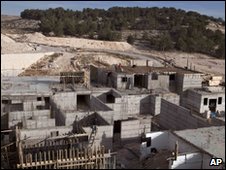|

Prime Minister Benjamin Netanyahu's plan to construct an additional 700 apartments in East Jerusalem is another blow to stalled peace talks between Israel and the Palestinians, the White House press secretary said on Monday.
"Neither party should engage in efforts or take actions that could unilaterally pre-empt, or appear to pre-empt, negotiations," said Robert Gibbs. "Rather, both parties should return to negotiations without preconditions as soon as possible."
The press secretary added that the status of Jerusalem is a permanent status issue that must be resolved by the parties through negotiations and supported by the international community
"We believe that through good faith negotiations the parties can mutually agree on an outcome that realizes the aspirations of both parties for Jerusalem, and safeguards its status for people around the world," he said.
Sweden, which holds the rotating European Union presidency, on Monday said Israel's latest plans prevent the creation of an atmosphere conducive to resuming negotiations on a two-state solution.
Under the new blueprint, the Housing Ministry has invited contractors to bid on the construction of 198 housing units in Pisgat Zeev, 377 homes in Neve Ya'akov and 117 dwellings in Har Homa.
Palestinians consider Jewish neighborhoods in East Jerusalem to be settlements and say such construction impedes peacemaking.
Israel claims all of the city its capital and does not consider those neighborhoods to be settlements. Israel captured East Jerusalem, home to
sensitive Jewish, Christian and Muslim holy sites, in the 1967 Six-Day War.
Netanyahu did not include East Jerusalem in the temporary construction freeze he declared weeks ago, saying the slowdown applies only to the West Bank.
"We make a distinction between the West Bank and Jerusalem. Jerusalem is our capital and remains such," government spokesman Mark Regev said on Monday.
A spokesman for Palestinian President Mahmoud Abbas condemned the plan, accusing Israel of exploiting what he called U.S. and international inability to halt settlement building.
"The Israeli government proves every day that it is not ready for peace," Abbas's spokesman, Nabil Abu Rdainah said.
"We condemn this Israeli policy of continuing settlement activities, and we hope this will be an eye opener for the U.S. administration and other members of the international community," added Palestinian official Saeb Erekat.
Meanwhile, the state is considering appropriating private Palestinian land in the West Bank, the State Prosecutor's Office informed the High Court of Justice on Sunday.
Such a move would contravene Netanyahu's commitment not to seize land for settlement expansion.
The prosecution's statement to the High Court on Monday came in response to a petition by human rights group Yesh Din against the construction of a sewage treatment facility that would serve the West Bank settlement of Ofra.
Construction of the facility began in 2007, on private Palestinian land from the nearby village of Ein Yabrud, in contravention of the government's approved master plan for the area.
"The fact that today the state is trying to legitimize the land theft ... by seizing land retroactively, for the sake of a settlement that was not long ago classified as 'the largest illegal outpost in the West Bank,' is nothing short of an outrage," said Shlomo Zacharia, one of the lawyers representing Yesh Din. "No less grave is the fact that this conduct, which contravenes the explicit policy of the government and the prime minister, aims to cover up the failures and unwillingness of the army and the state in defending Palestinian property."
The state said the treatment facility was built illegally, without construction permits, and that demolition orders have been issued for its destruction. However, based on the state's response to the petition, it does not appear to be planning to enforce the law or return the land to its rightful owners. The state did say that it is examining various alternatives to dealing with the issue.
Flying in the face of commitments
The state's position on the treatment facility appears to fly in the face of commitments Israel has made.
"Land will not be appropriated for the expansion of existing settlements," Netanyahu said in a June speech at Bar-Ilan University.
President Shimon Peres made a similar statement at a press conference in Cairo several weeks ago, after meeting with Egyptian President Hosni Mubarak.
Eitan Broshi, Barak's adviser on settlement affairs, told the High Court that Ofra was the largest illegal outpost in the territories and said most of it was built illegally on private land belonging to the residents of nearby villages. He said construction permits were not issued and that no jurisdictional borders had been defined for Ofra.
Yesh Din asked the High Court in May to order a halt to all work related to the construction of the sewage treatment plant and to suspend funding for it. It also asked the court to order the Civil Administration and Shai District police, which are responsible for the West Bank, to enforce the demolition orders and destroy the facility. The petition was filed by Zacharia, Michael Sfard and Avisar Lev.
The sewage treatment facility takes up 37 dunams, of which 33 are underground. It costs an estimated NIS 7.8 million, which is funded by the government, according to official reports. Plans for building the plant were also carried out by government authorities.
In the early 1980s a different section of Ofra was appropriated for the construction of a sewage plant, but after Ofra's southern neighborhood was built next to that land several years later, it was decided to move the plant to a different location. That land, too, like the site of most of the homes there, is on private Palestinian land.
|
 Tuesday, December 29, 2009 at 07:04PM
Tuesday, December 29, 2009 at 07:04PM  APJP |
APJP |  Post a Comment |
Post a Comment | 